- Home
- Warhammer 40K
Old Soldiers Never Die - Sandy Mitchell Page 5
Old Soldiers Never Die - Sandy Mitchell Read online
Page 5
Samier grasped the icon of the Emperor hanging around his neck, his lips moving for a moment in some calming litany. When he spoke aloud again, it was with greater deliberation. Which might sound odd, but was actually fairly typical; the average Tallarn will call on the Emperor at the drop of a hat, and generally feel that He’s answered, however unlikely that may seem to anyone else in the vicinity. (Any non-Tallarn, that is; their fellows will take it as read that Him on Earth has revealed His divine will, and go along with even the most palpable idiocy. Luckily they seem to take it for granted that their officers and chaplains are granted the most cogent insights, otherwise they’d be completely unmanageable.) “Then by all means, make your tests,” he said. “If we discredit this nonsense as soon as possible, less time will be wasted.”
“And if you do turn out to be the carriers?” I said, because somebody had to, and he was least likely to take offence if it came from me.
“Then we do the Emperor’s work in being the means of salvation for this world,” Samier responded, with neat circular logic.
“Throne be praised,” I said, mouthing the phrase and making the sign of the aquila at the same time he did[18] .
“But that wasn’t what I meant.” I indicated the schematic of the city, which was speckled with icons like a case of the pox. Which, come to think of it, was far too apposite an analogy for my peace of mind. Each blemish represented a Guard unit, those tagged with the identifiers of the 597th or the Tallarns far outnumbering the others, or an incident involving another group of the walking dead, which had become more and more numerous in the days following the carnage in the cathedral. We’d had riots, too, as the news had spread and the panicking population became ever more desperate to escape the quarantine zones intended to protect them from infection. Throne alone knew where they expected to go, I doubt they knew themselves, but anywhere out of the city seemed to offer an illusion of safety. “We’re barely keeping a lid on things now. If your regiment has to be quarantined too, we’re all frakked.”
“Then we should redeploy at once,” Samier said, rising from his seat to approach the hololith controls. After a moment, the positions of the icons shuffled around, to leave the 597th clustered in the city centre, securing the governor’s palace, the Mechanicus shrine, and the Administratum cloister. “My regiment will secure the boundaries of the quarantine zones, which, if the Emperor wills, we can do just as effectively from the inside as out.”
“Works for us,” the evanescent Kasteen agreed, after a moment.
I nodded too, although I was far from happy with the arrangement, which would leave us surrounded by potential enemies with nowhere to go so far as I could see. On the other hand, there was plenty of room in the palace grounds to land a shuttle, and I made a mental note to make sure we had one on standby. “Makes good sense,” I said, as though I thought that was a sound reason for doing it.
“Magos, a question,” Mostrue interjected at this point. “What’s your prognosis for the Guardsmen already infected?”
Moroe looked surprised. “What it’s always been,” he replied. “They’ll die. The virus will then stimulate electrochemical activity in the brain stem, restoring motor and sensory functions, after a fashion. The resulting revenant will be driven purely by instinct, principally aggression, and the need to feed.”
“Then we should begin culling the sick immediately,” one of the Vostroyan commissars stated flatly.
“And burn the bodies,” I added reluctantly. A nagging sense of something we’d forgotten gibbered quietly at the back of my head for a moment, before making itself heard at last. “What about the casualties from the fighting before we got here?” I asked, already sure I wouldn’t like the answer. “They weren’t cremated, were they?”
“No.” Samier shook his head. “There was no time for ceremonial. They were buried in mass graves.”
A trickle of ice water seemed to run down my spine. “Where are they?” I asked.
Everyone present looked from one to the other, and the floating heads in the hololith seemed equally baffled.
“The city authorities would have handled that,” Jona said. “But no one’s been keeping up with the filing lately.” Big surprise there.
“Try the Ecclesiarchy,” I suggested. “They would have insisted on holding some kind of ceremony.”
“I’ll get on to Callister,” the governor promised.
“Good.” Much as I’d have liked to have remained in the bunker indefinitely, my morale-boosting role meant that I had to show my face to the troops, and be seen to be looking relaxed and unconcerned by the civilians to boot. I rose, trying my best to seem nonchalant. “I’ll discuss it with you when I get to the palace.”
“You’re coming here?” Even out of focus as he was, Jona’s face took on an unmistakable expression of surprise.
“The redeployment,” I reminded him. “We’ll be digging in all around you.”
“Oh.” He sounded as though he was trying to make light of the situation, and not succeeding very well. “That’s reassuring.”
“I’m glad you think so,” I said, wishing I shared his optimism.
Editorial Note:
The following extract adds very little to Cain’s account, but I’ve included it nevertheless, since it confirms much of what he implies about the prevailing situation.
From The Liberation of Lentonia, by Jonas Worden, uncompleted manuscript.
Things got worse by the day. Bands of revenants were everywhere, and the Imperial Guard hunted them down wherever they could, trying to protect the civilians. Many citizens tried to flee the city, and became prey for the walking dead, but plenty were still willing to take the risk, and there were more riots as the Guard tried to keep the enclaves secured.
These disturbances got worse as food and medical supplies became scarcer. Lentonia had always relied on off-world imports, but with the plague confirmed, I was forced to close the system to merchant vessels. If we couldn’t control the outbreak soon, we’d starve.
Emperor forgive me. I knew there was a reason I never wanted this job.
FIVE
Jurgen was waiting for me outside the bunker as patiently as ever, paging through a porno slate, and basking in the cooling temperatures as the sun began to wester over the hab-blocks visible in the distance above the lower, functional buildings of the militia compound. Apart from my aide, his feet propped comfortably up on the dashboard of the still roofless Salamander, the complex of barrack rooms, workshops and parade grounds was almost deserted, the few troopers visible scurrying about their business in ones and twos in eerie silence. A place like this should have been bustling with activity, the tramp of marching boots, engines revving, and a constant crackle of lasgun fire from the practice butts echoing everywhere, but the loudest sounds I could hear were the moaning of the wind, and the gurgling of Jurgen’s digestive tract.
“Good meeting, sir?” he greeted me, before dropping into the Salamander and firing up the engine. I clambered aboard gratefully, pulling my greatcoat a little tighter as I did so; although I suspected the shiver I’d felt had little to do with the freshening breeze.
“I’ve had better,” I told him honestly. So far as I could see, it all came down to whether the blood of a bunch of religious fanatics contained anything Moroe could create a vaccine from. Not odds I felt happy to be betting my life on.
“Back to RHQ[19] ?” Jurgen asked, slamming the Salamander into gear, and I nodded, grabbing the pintle mount for support as he spun the treads and took off towards the gate at his usual breakneck speed.
“Yes,” I said, knowing Kasteen and Broklaw would be keen to discuss these latest developments a good deal more candidly than we could over a vox-link. “But swing by the palace first.” If we were going to be deploying there we’d need a feel for the ground, which no map, however detailed, could give us, and I always felt happier in a new location after identifying any boltholes or lines of retreat. Besides which, it would give me
a chance to talk to Jona; he was supposed to be our point of contact with the civilian authorities, insofar as there were any of those left at all, and he’d been worryingly uncommunicative of late. But then I imagined he had a lot on his mind.
“Palace it is, sir,” Jurgen confirmed, slowing with obvious reluctance in order to negotiate the gate without sending the little knot of apprehensive-looking sentries leaping for their lives. The usual fortifications had been supplemented with boxes, chemical drums, and anything else which had come to hand, and the barrels of a couple of sandbagged autocannon looked warily down the boulevard beyond, towards the heart of the city. Undermanned as the post was, I doubted whether it could have withstood a siege by sufficiently determined toddlers, but I dispensed a handful of morale-boosting platitudes as we trundled by, which the infantrymen seemed to appreciate. They dragged a couple of drums out of the way to let us pass with a fine display of efficiency, snapped me an unexpected salute[20] , which I returned in my best parade ground style, and began reassembling their makeshift barricade as Jurgen gunned the throttle again, and took off like a gretchin catching sight of an ork with a recipe book.
The slowly darkening city was an eerie sight as we howled down boulevards and thoroughfares deserted apart from the occasional prowling Chimera, their turret-mounted searchlights swinging as they stabbed into alley mouths and the shattered windows of looted emporia. Many of the waylights were still functioning, although deep lakes of darkness lay between these isolated patches of luminescence, casting flickering shadows in the depths of the buildings, in the cover of which anything might be lurking. Several times I caught glimpses of stealthy movement, or thought I did, and swung the pintle mount around to bear on it, but nothing inimical ever appeared, leaving me to wonder whether they’d been produced by solitary looters whose greed outweighed their sense of self-preservation, scavenging rodents, or my own imagination.
If I had begun to doubt the dangers of the journey, however, I was soon disabused by the distant roar of a heavy bolter, quickly joined by another, and then a third. At least one of the patrolling Chimeras had evidently found a group of revenants large enough to require calling for reinforcements. The firing seemed a fair way away, but I’d been in enough cityfights to know how the sounds of combat could be distorted by the intervening buildings, echoes rolling back on themselves or being muffled by the surrounding hab-blocks, making direction and distance almost impossible to estimate with any degree of accuracy.
“Do you want to see what’s happening?” Jurgen asked, his voice a little attenuated in my vox-bead.
“No need,” I said, quickly scanning the frequencies, and pinpointing the action almost at once. A Tallarn platoon in the process of redeployment had run into a mob of the revenants, just as I’d surmised, and was currently engaged in shooting their way out again. “The Chimera crews have got the hatches sealed, and are picking them off with the bolters.” Which should indeed make short work of the shambling corpses. “If we stick our noses in, we’d only get in the way.” Followed almost at once by attracting the unwanted attention of every surviving revenant in the group, since, unlike the Chimera crews safely locked away behind a few centimetres of armour plate, we were in a vulnerable scout vehicle. “Just keep heading straight for the palace.”
“Right you are, sir,” Jurgen acknowledged, and, taking the instruction as literally as he did most other things, swung us off the road. The Salamander’s suspension bounced over the raised kerb separating the carriageway from the pavement, then we burst through a pair of ornamental wrought-iron gates, which tore free of their hinges and went bouncing away with a clangour loud enough to be heard over the roar of our engine. Fortunately I’d grown used to his robust approach to driving over the years, and remained on my feet, after making a reflexive grab for the pintle mount the moment I felt the Salamander lurch to the right.
Clods of earth began to fly up from our spinning tracks, and I looked round to discover that we appeared to be hurtling across a wide, manicured lawn, rather more shaggy in appearance than the long-departed gardeners who used to work here would probably have approved of.
“Where are we?” I asked, more resigned than annoyed; after serving together for so long, I suppose I should have learned it was wise to qualify instructions like that with ‘keeping to the road’ by now.
“City park,” Jurgen informed me, in his usual matter-of-fact fashion. “Connects up with the palace grounds.” A couple of intricately topiarised bushes disappeared beneath our tracks with a faint crunch. “Just past the Eternal Garden.”
“Eternal Garden?” I repeated, with a sudden sinking feeling. This far from the road we were surrounded by darkness and shadows, in which anything might lurk. Strange, amorphous shapes rose up out of the gloom, shrubberies perhaps, although everything beyond the cone of light thrown ahead of us by the Salamander’s headlamps might just as well have been hewn from solid chunks of the night itself. The glimmering pinpricks delineating the distant buildings surrounding this ocean of darkness seemed as remote as the stars which shone down from above with cold indifference.
“That’s what it says on the map, anyway,” my aide amplified. “Big building, lots of little ones. And a drive, leads to the road on the other side. Palace grounds are directly opposite where it comes out.”
“I see,” I said, as calmly as I could. “That should save us a bit of time.” I pulled out the pocket-sized city guide Jona had thoughtfully presented me with shortly after my arrival, in spite of the fact that many of the major landmarks therein were no longer standing, and began to page through it in search of the one we were approaching. As I’d expected, there was quite a comprehensive entry, which was hardly surprising, given that it was the most notable burial ground in Viasalix.
“Just what I thought,” Jurgen said, as imperturbable as ever.
Ignoring the remark, I read feverishly, hoping to discover just how much trouble we were in, and gradually my initial panic began to subside. The necropolis was the ceremonial resting place of the planetary governors and other Lentonian notables, and as such was widely venerated by the locals. There didn’t seem to have been an interment there for years, however[21] , which came as a great relief: if no one had been buried since the outbreak, they were hardly likely to pop up again to cause me any trouble.
At which point the headlights picked out movement in the distance, as if part of the darkness had flowed away beyond the illuminated cone. Despite my rational mind insisting that it was probably no more real a threat than the shapes I thought I’d seen in the depths of the abandoned emporia, I checked the heavy bolter and fed the first round into the breech. I haven’t lasted long enough to reach an honourable retirement by letting rationality get the better of paranoia, and this occasion was to prove no exception.
* * *
The necropolis, when we reached it, turned out to be a surprisingly elegant building, rather than the over-ornamented stone barn my previous experience of such places had led me to expect. Rather, it was high and well-proportioned, tapering upwards to a sharply pitched roof supported by an elegant colonnade, the caryatids of which all turned pious faces towards the image of Him on Earth looking down benignly from beneath the eaves. The entire edifice had been faced in white marble, which appeared to glow faintly in the dim blue illumination of the stars, and lent it an ethereal quality perfectly in keeping with its rather grim purpose. A number of other tombs, far smaller, and, so far as I could make out in the darkness, rather less tastefully ornamented, surrounded it, like utility craft keeping station with a starship, and at the sight of those my apprehension increased considerably. Who had been interred within them[22] , or how recently, was anybody’s guess, and I could be rather less sure than before that we were in no immediate danger.
“Give it a wide berth,” I said, and my aide complied, taking us in a long, wide arc around the ominous cluster of ossuaries. I strained my eyes through the darkness, expecting at any moment to catch a glimpse
of sinister shadows moving among them, but still I saw nothing; then Jurgen abruptly swung the Salamander back towards the boneyard.
“We’ll have to cut across the corner of it,” he said, as though it was only a minor inconvenience. “We’ll get stuck in the trees otherwise.”
I turned, looking out to the right, instead of leftwards towards the necropolis. Sure enough, the night seemed darker in that direction, stars and city lights alike occulted by a solid bank of vegetation, looming against the horizon like a low-lying thunder cloud. Hanging on to the heavy bolter by one hand, for fear of another sudden change of direction, I glanced down at the plan in the book, finding the patch of woodland much smaller in its graphic representation than it appeared to be in reality. The drive leading to the gate on the other side of the park was relatively close, but we’d have to make our way through a slalom of tombs now in order to reach it. Which would mean slowing down, which would, in turn, leave us more vulnerable to attack. (Why it occurred to neither of us to simply return to the gate by which we’d entered the park in the first place I have no idea; all I can think of is that we were both so keyed up by that time, and, in my case at least, so fearful of attack, that we were thinking of nothing else beyond our original goal.)
There was still no movement that I could see, so I thumbed my palm[23] , asked the Emperor’s protection (despite being convinced that He had far more pressing matters to attend to than preserving my miserable hide, but it never hurt to ask), and curled my fingers around the grip of the heavy bolter. “Take us in,” I said, feeling as ready as I’d ever be.
Jurgen complied, as phlegmatically as he did everything else, and the growling note of our engine dropped an octave. We slowed, and began to move towards the low-lying huddle of satellite tombs at a more sedate pace, the bright glare of the headlights picking out every detail. Some were almost pristine, testament to the industry of the living who still mourned the occupants, while others were encrusted with lichen and climbing plants, which scrambled over crumbling devotional icons, in the worst cases all but obliterating them.

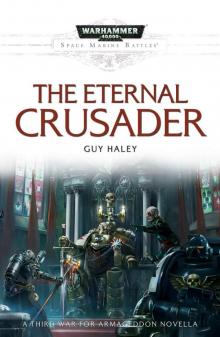 The Eternal Crusader - Guy Haley
The Eternal Crusader - Guy Haley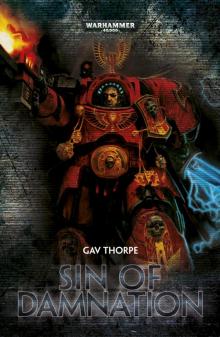 Sin of Damnation - Gav Thorpe
Sin of Damnation - Gav Thorpe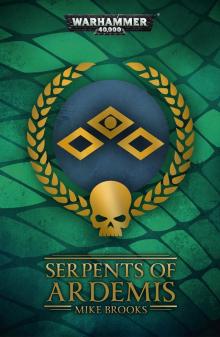 Serpents of Ardemis - Mike Brooks
Serpents of Ardemis - Mike Brooks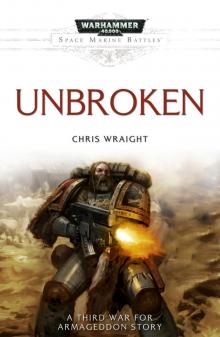 Unbroken - Chris Wraight
Unbroken - Chris Wraight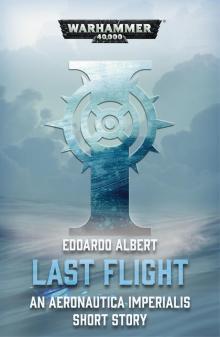 Last Flight - Edoardo Albert
Last Flight - Edoardo Albert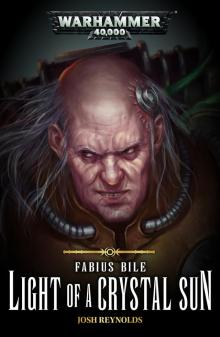 Light of a Crystal Sun - Josh Reynolds
Light of a Crystal Sun - Josh Reynolds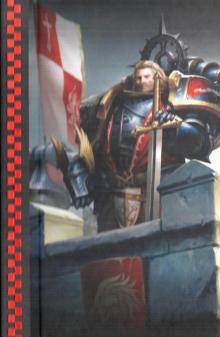 Lion El'Jonson- Lord of the First - David Guymer
Lion El'Jonson- Lord of the First - David Guymer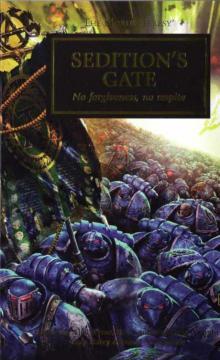 Sedition's Gate - Nick Kyme & Chris Wraight
Sedition's Gate - Nick Kyme & Chris Wraight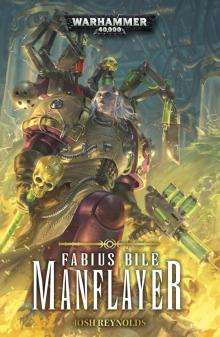 Manflayer - Josh Reynolds
Manflayer - Josh Reynolds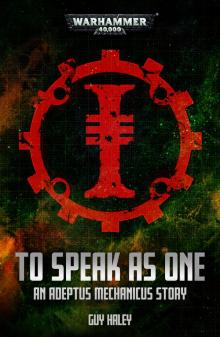 To Speak as One - Guy Haley
To Speak as One - Guy Haley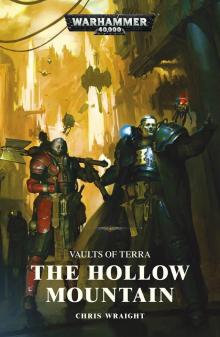 Vaults of Terra- The Hollow Mountain - Chris Wraight
Vaults of Terra- The Hollow Mountain - Chris Wraight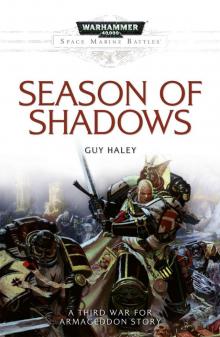 Season of Shadows - Guy Haley
Season of Shadows - Guy Haley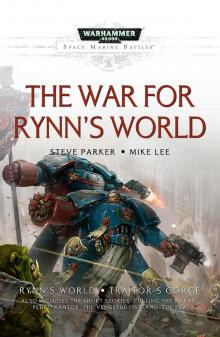 The War for Rynn's World - Steve Parker & Mike Lee
The War for Rynn's World - Steve Parker & Mike Lee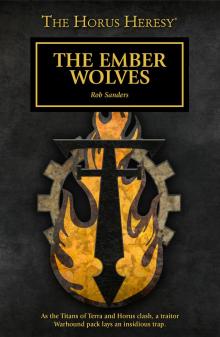 The Ember Wolves - Rob Sanders
The Ember Wolves - Rob Sanders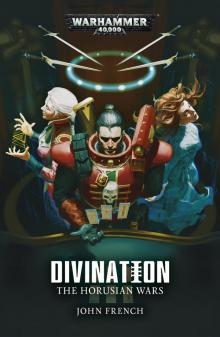 Divination - John French
Divination - John French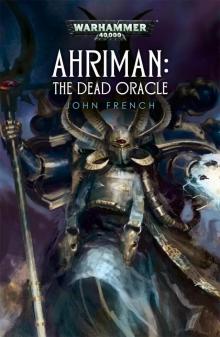 The Dead Oracle - John French
The Dead Oracle - John French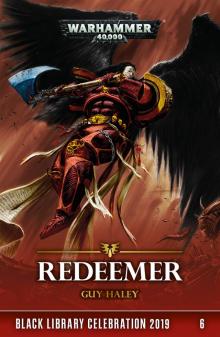 Redeemer - Guy Haley
Redeemer - Guy Haley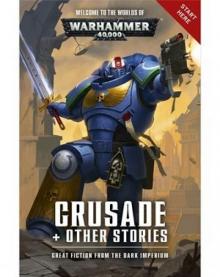 Crusade & Other Stories - Dan Abnett Et Al.
Crusade & Other Stories - Dan Abnett Et Al.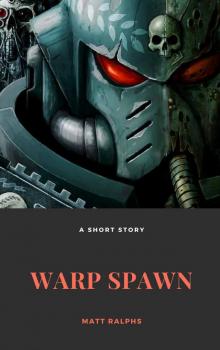 Warp Spawn - Matt Ralphs
Warp Spawn - Matt Ralphs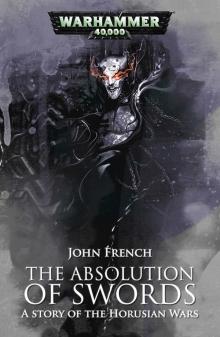 The Absolution of Swords - John French
The Absolution of Swords - John French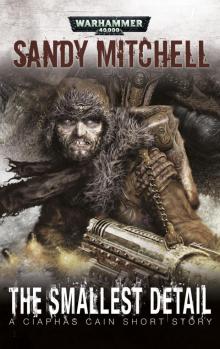 The Smallest Detail - Sandy Mitchell
The Smallest Detail - Sandy Mitchell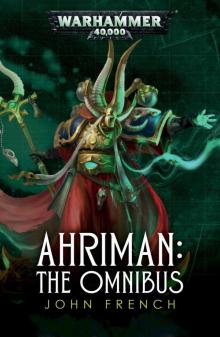 The Omnibus - John French
The Omnibus - John French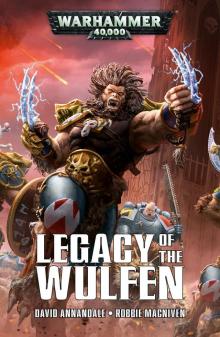 Legacy of the Wulfen - David Annandale & Robbie MacNiven
Legacy of the Wulfen - David Annandale & Robbie MacNiven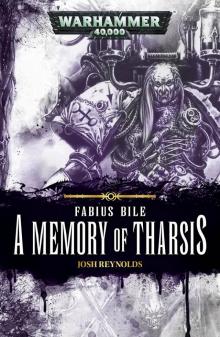 A Memory of Tharsis - Josh Reynolds
A Memory of Tharsis - Josh Reynolds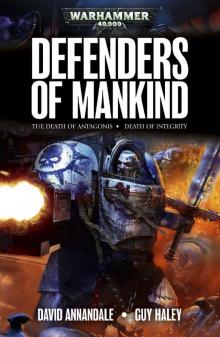 Defenders of Mankind - David Annandale & Guy Haley
Defenders of Mankind - David Annandale & Guy Haley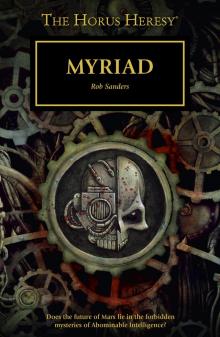 Myriad - Rob Sanders
Myriad - Rob Sanders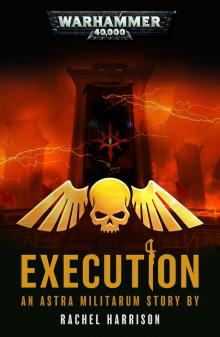 Execution - Rachel Harrison
Execution - Rachel Harrison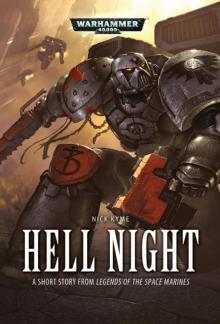 Hell Night - Nick Kyme
Hell Night - Nick Kyme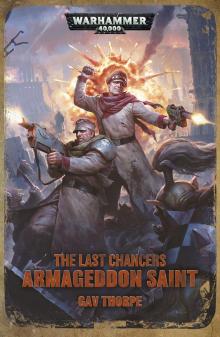 Armageddon Saint - Gav Thorpe
Armageddon Saint - Gav Thorpe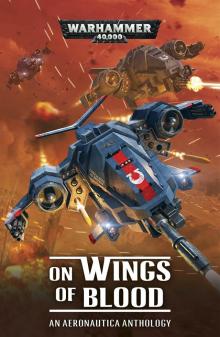 On Wings of Blood
On Wings of Blood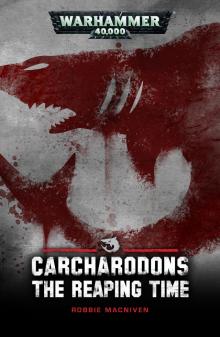 The Reaping Time - Robbie MacNiven
The Reaping Time - Robbie MacNiven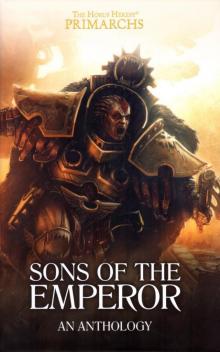 Sons of the Emperor
Sons of the Emperor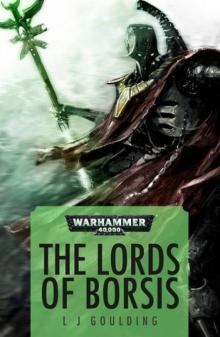 The Lords of Borsis - L J Goulding
The Lords of Borsis - L J Goulding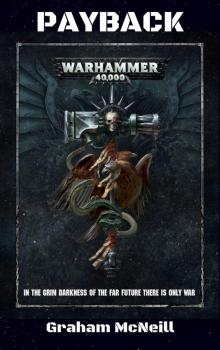 Payback - Graham McNeill
Payback - Graham McNeill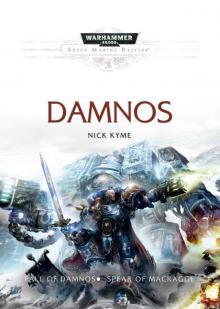 Damnos - Nick Kyme
Damnos - Nick Kyme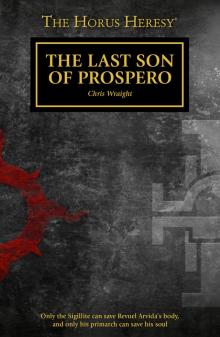 The Last Son of Prospero - Chris Wraight
The Last Son of Prospero - Chris Wraight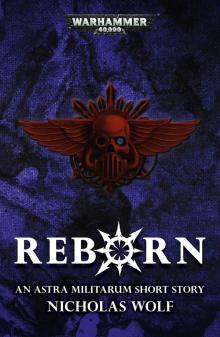 Reborn - Nicholas Wolf
Reborn - Nicholas Wolf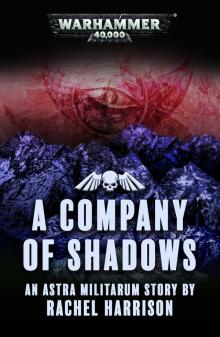 A Company of Shadows - Rachel Harrison
A Company of Shadows - Rachel Harrison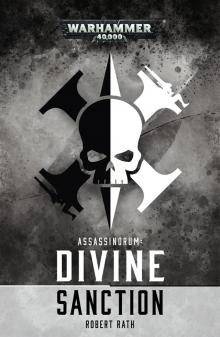 Assassinorum- Divine Sanction - Robert Rath
Assassinorum- Divine Sanction - Robert Rath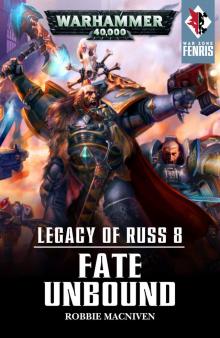 Fate Unbound - Robbie MacNiven
Fate Unbound - Robbie MacNiven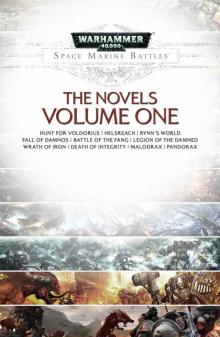 Space Marine Battles - the Novels Volume 1
Space Marine Battles - the Novels Volume 1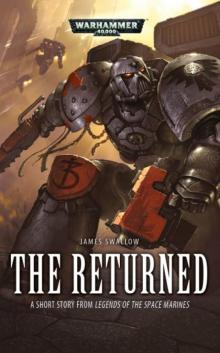 The Returned - James Swallow
The Returned - James Swallow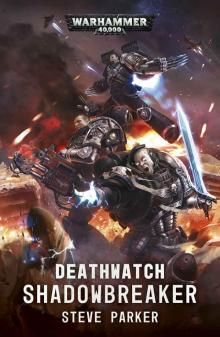 Shadowbreaker - Steve Parker
Shadowbreaker - Steve Parker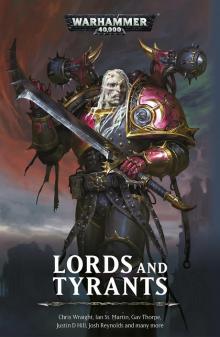 Lords and Tyrants
Lords and Tyrants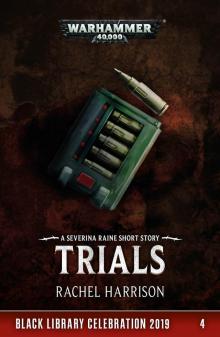 Trials - Rachel Harrison
Trials - Rachel Harrison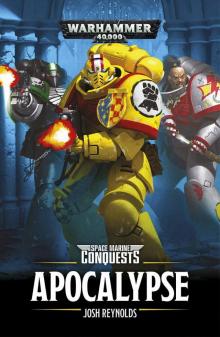 Apocalypse - Josh Reynolds
Apocalypse - Josh Reynolds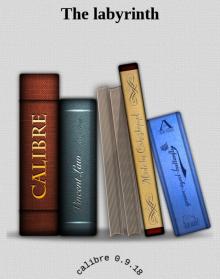 The labyrinth - Richard Ford
The labyrinth - Richard Ford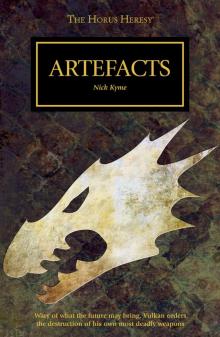 Artefacts - Nick Kyme
Artefacts - Nick Kyme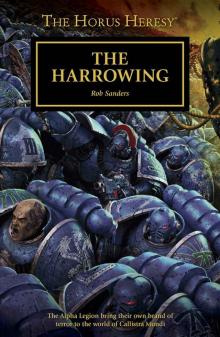 The Harrowing - Rob Sanders
The Harrowing - Rob Sanders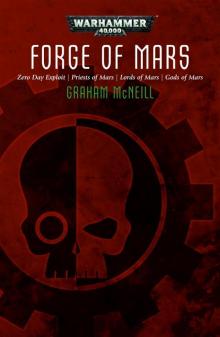 Forge of Mars - Graham McNeill
Forge of Mars - Graham McNeill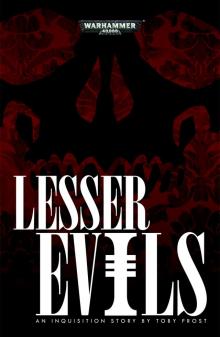 Lesser Evils - Toby Frost
Lesser Evils - Toby Frost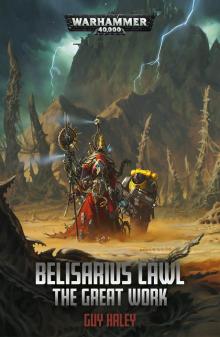 Belisarius Cawl- the Great Work - Guy Haley
Belisarius Cawl- the Great Work - Guy Haley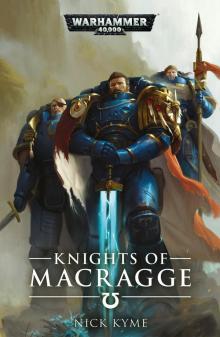 Knights of Macragge - Nick Kyme
Knights of Macragge - Nick Kyme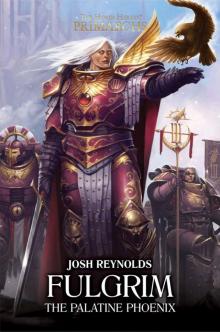 Fulgrim- The Palatine Phoenix - Josh Reynolds
Fulgrim- The Palatine Phoenix - Josh Reynolds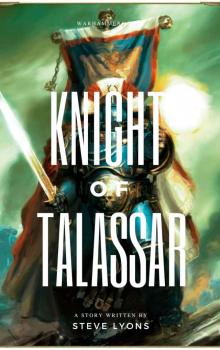 Knight of Talassar - Steve Lyons
Knight of Talassar - Steve Lyons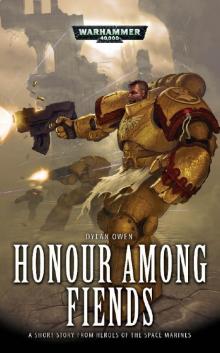 Honour Among Fiends - Dylan Owen
Honour Among Fiends - Dylan Owen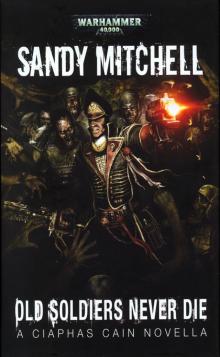 Old Soldiers Never Die - Sandy Mitchell
Old Soldiers Never Die - Sandy Mitchell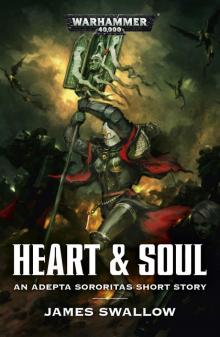 Heart & Soul - James Swallow
Heart & Soul - James Swallow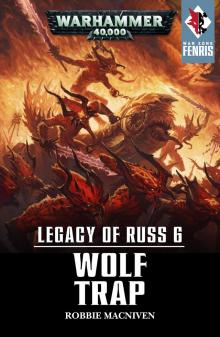 Wolf Trap - Robbie MacNiven
Wolf Trap - Robbie MacNiven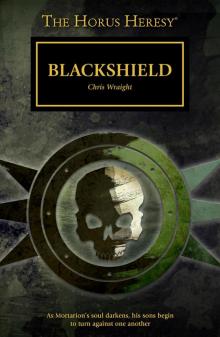 Blackshield - Chris Wraight
Blackshield - Chris Wraight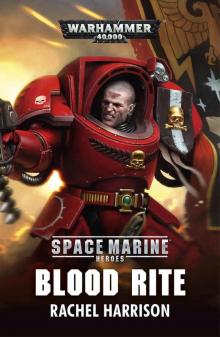 Blood Rite - Rachel Harrison
Blood Rite - Rachel Harrison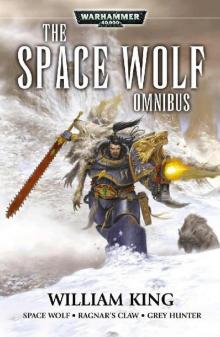 The Space Wolf Omnibus - William King
The Space Wolf Omnibus - William King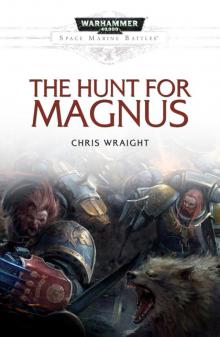 The Hunt for Magnus - Chris Wraight
The Hunt for Magnus - Chris Wraight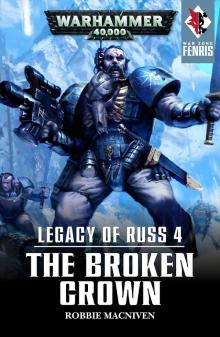 The Broken Crown - Robbie MacNiven
The Broken Crown - Robbie MacNiven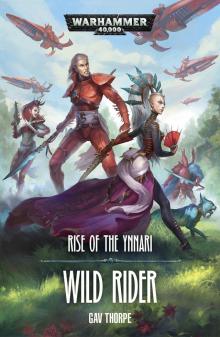 Wild Rider - Gav Thorpe
Wild Rider - Gav Thorpe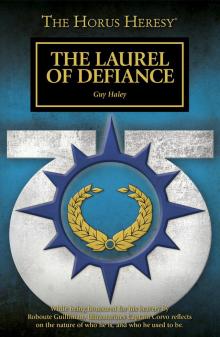 The Laurel of Defiance - Guy Haley
The Laurel of Defiance - Guy Haley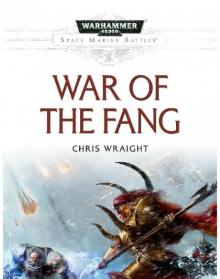 War of the Fang - Chris Wraight
War of the Fang - Chris Wraight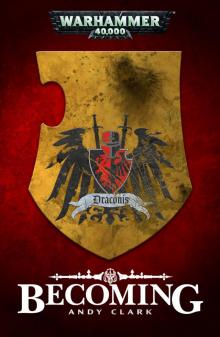 Becoming - Andy Clark
Becoming - Andy Clark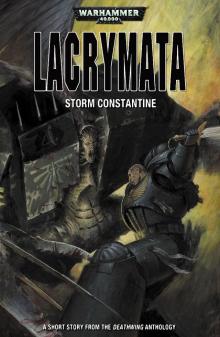 Lacrymata - Storm Constantine
Lacrymata - Storm Constantine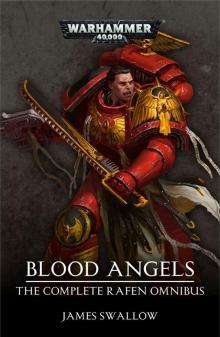 Blood Angels - The Complete Rafen Omnibus - James Swallow
Blood Angels - The Complete Rafen Omnibus - James Swallow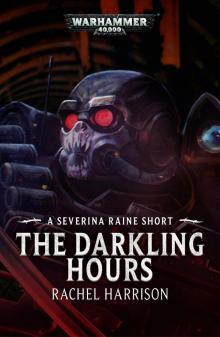 The Darkling Hours - Rachel Harrison
The Darkling Hours - Rachel Harrison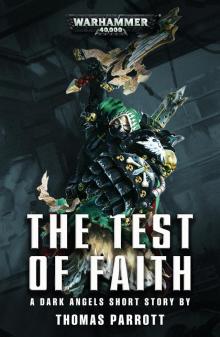 The Test of Faith - Thomas Parrott
The Test of Faith - Thomas Parrott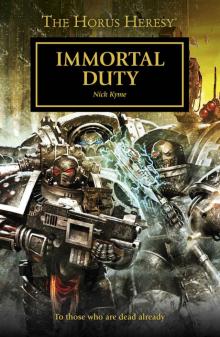 Immortal Duty - Nick Kyme
Immortal Duty - Nick Kyme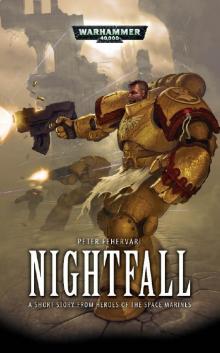 Nightfall - Peter Fehervari
Nightfall - Peter Fehervari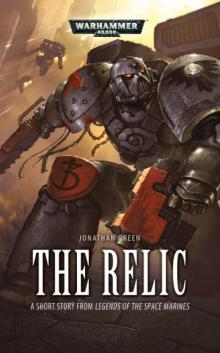 The Relic - Jonathan Green
The Relic - Jonathan Green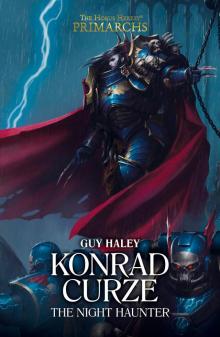 Konrad Curze the Night Haunter - Guy Haley
Konrad Curze the Night Haunter - Guy Haley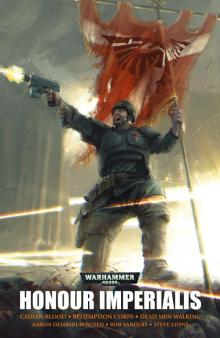 Honour Imperialis - Aaron Dembski-Bowden
Honour Imperialis - Aaron Dembski-Bowden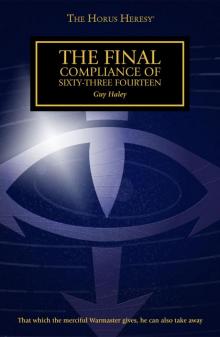 The Final Compliance of Sixty-Three Fourteen - Guy Haley
The Final Compliance of Sixty-Three Fourteen - Guy Haley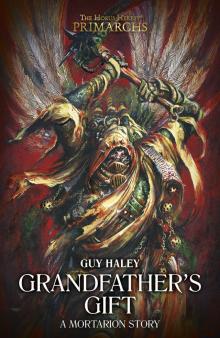 Grandfather’s Gift - Guy Haley
Grandfather’s Gift - Guy Haley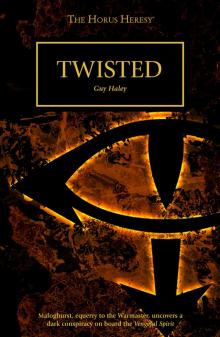 Twisted - Guy Haley
Twisted - Guy Haley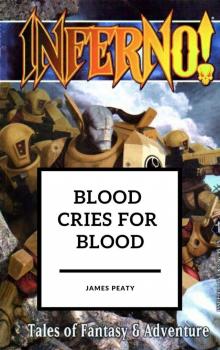 Blood Cries for Blood - James Peaty
Blood Cries for Blood - James Peaty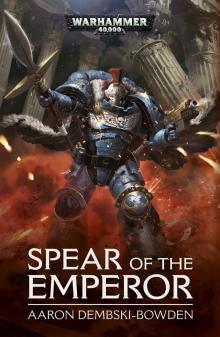 Spear of the Emperor - Aaron Dembski-Bowden
Spear of the Emperor - Aaron Dembski-Bowden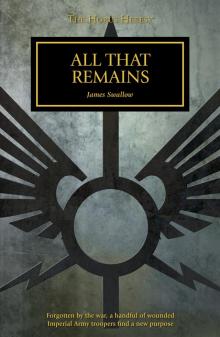 All That Remains - James Swallow
All That Remains - James Swallow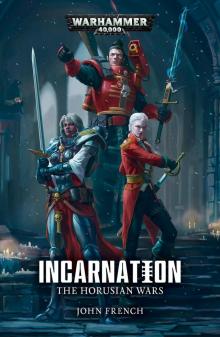 Incarnation - John French
Incarnation - John French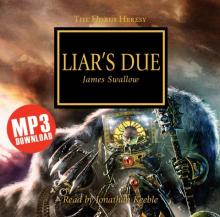 Liar's Due - Ben Swallow
Liar's Due - Ben Swallow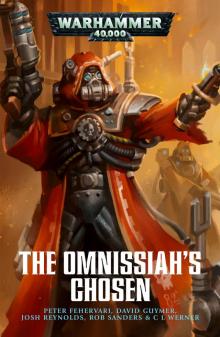 The Omnissiah's Chosen - Peter Fehervari
The Omnissiah's Chosen - Peter Fehervari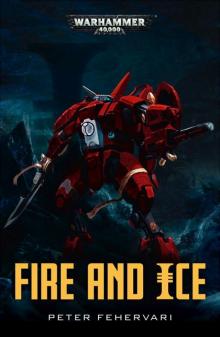 Fire and Ice - Peter Fehervari
Fire and Ice - Peter Fehervari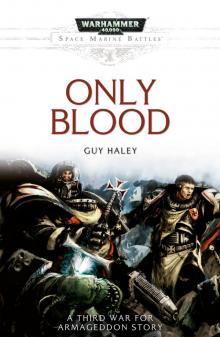 Only Blood - Guy Haley
Only Blood - Guy Haley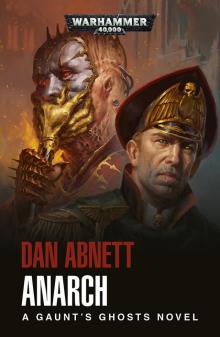 Anarch - Dan Abnett
Anarch - Dan Abnett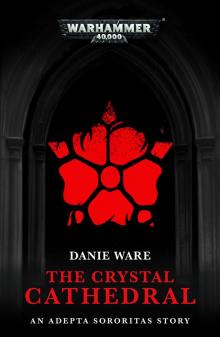 The Crystal Cathedral - Danie Ware
The Crystal Cathedral - Danie Ware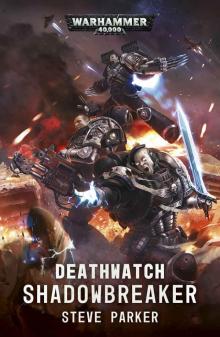 Shadowbreaker
Shadowbreaker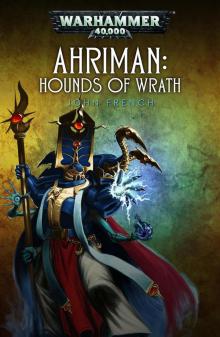 Hounds of Wrath - John French
Hounds of Wrath - John French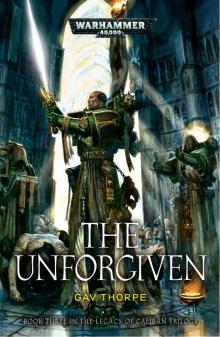 The Unforgiven - Gav Thorpe
The Unforgiven - Gav Thorpe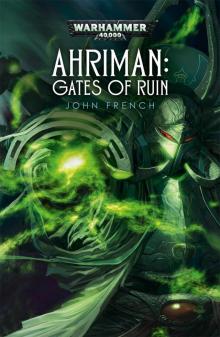 Gates of Ruin - John French
Gates of Ruin - John French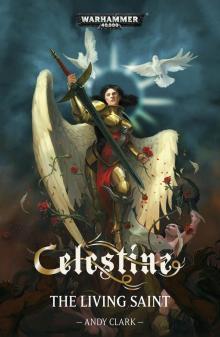 Celestine - Andy Clark
Celestine - Andy Clark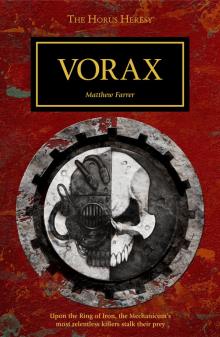 Vorax - Matthew Farrer
Vorax - Matthew Farrer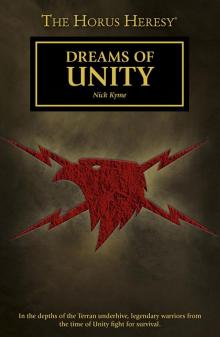 Dreams of Unity - Nick Kyme
Dreams of Unity - Nick Kyme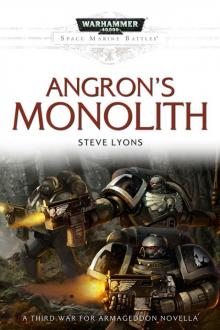 Angron's Monolith - Steve Lyons
Angron's Monolith - Steve Lyons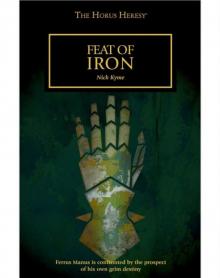 Feat of Iron - Nick Kyme
Feat of Iron - Nick Kyme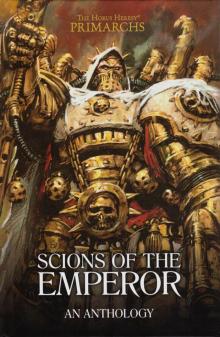 Scions of the Emperor
Scions of the Emperor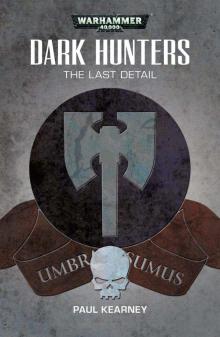 The Last Detail - Paul Kearney
The Last Detail - Paul Kearney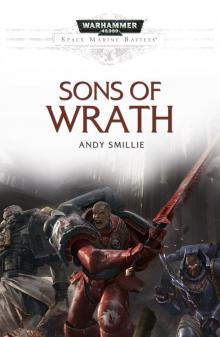 Sons of Wrath - Andy Smillie
Sons of Wrath - Andy Smillie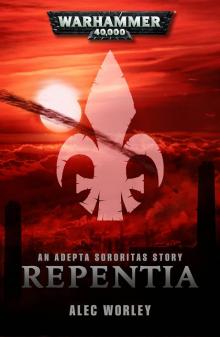 Repentia - Alec Worley
Repentia - Alec Worley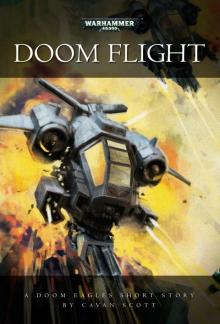 Doom Flight - Cavan Scott
Doom Flight - Cavan Scott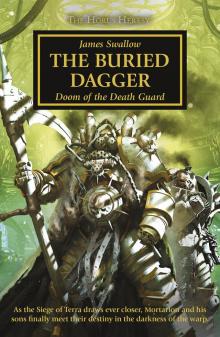 The Buried Dagger - James Swallow
The Buried Dagger - James Swallow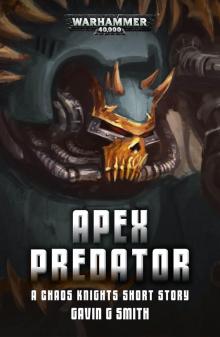 Apex Predator - Gavin G Smith
Apex Predator - Gavin G Smith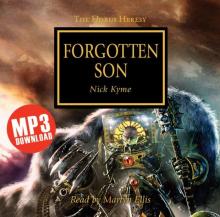 Forgotten Sons - Nick Kyme
Forgotten Sons - Nick Kyme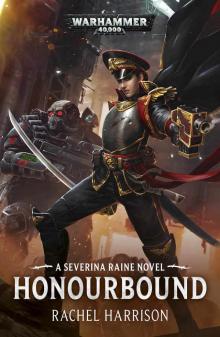 Honourbound - Rachel Harrison
Honourbound - Rachel Harrison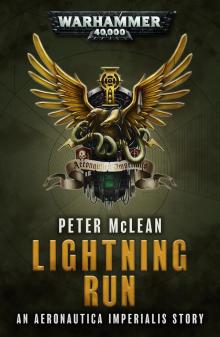 Lightning Run - Peter McLean
Lightning Run - Peter McLean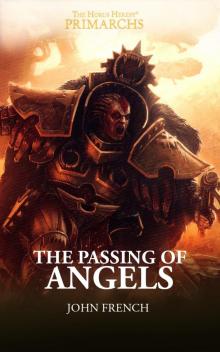 The Passing of Angels - John French
The Passing of Angels - John French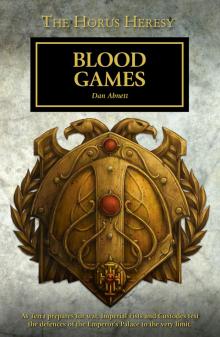 Blood Games - Dan Abnett
Blood Games - Dan Abnett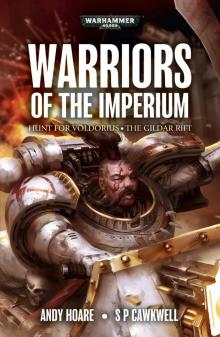 Warriors of the Imperium - Andy Hoare & S P Cawkwell
Warriors of the Imperium - Andy Hoare & S P Cawkwell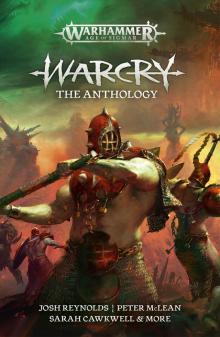 Warcry
Warcry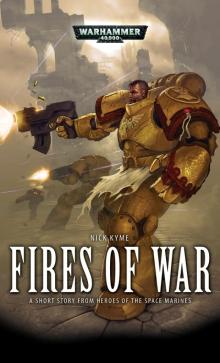 Fires of War - Nick Kyme
Fires of War - Nick Kyme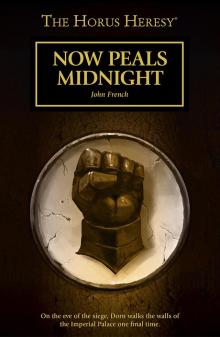 Now Peals Midnight - John French
Now Peals Midnight - John French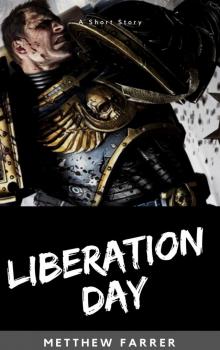 Liberation Day - Matthew Farrer
Liberation Day - Matthew Farrer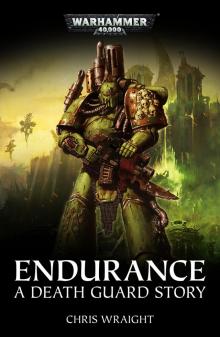 Endurance - Chris Wraight
Endurance - Chris Wraight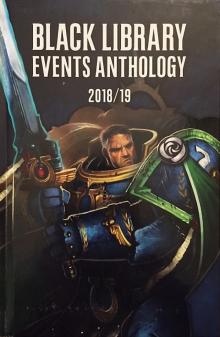 Black Library Events Anthology 2018-19
Black Library Events Anthology 2018-19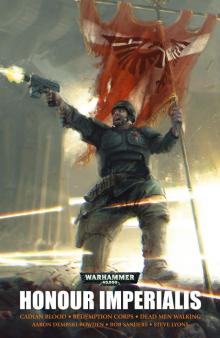 Honour Imperialis - Braden Campbell & Aaron Dembski-Bowden & Chris Dows & Steve Lyons & Rob Sanders
Honour Imperialis - Braden Campbell & Aaron Dembski-Bowden & Chris Dows & Steve Lyons & Rob Sanders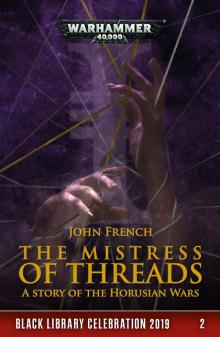 The Mistress of Threads - John French
The Mistress of Threads - John French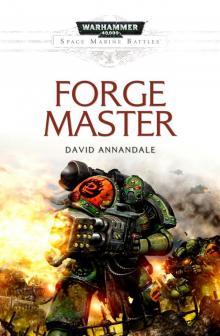 Forge Master - David Annandale
Forge Master - David Annandale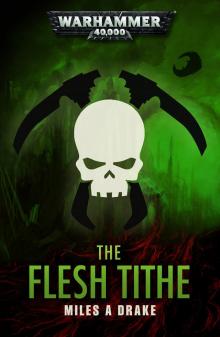 The Flesh Tithe - Miles A Drake
The Flesh Tithe - Miles A Drake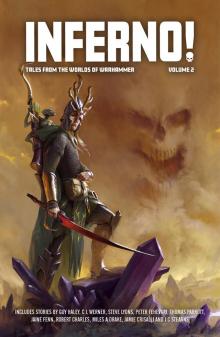 Inferno Volume 2 - Guy Haley
Inferno Volume 2 - Guy Haley Mercy of the Dragon - Nick Kyme
Mercy of the Dragon - Nick Kyme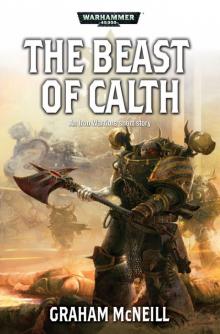 The Beast of Calth - Graham McNeill
The Beast of Calth - Graham McNeill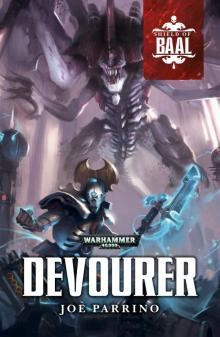 Devourer - Joe Parrino
Devourer - Joe Parrino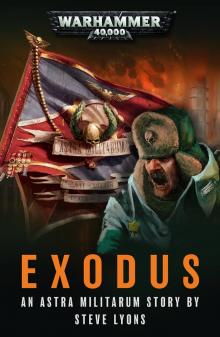 Exodus - Steve Lyons
Exodus - Steve Lyons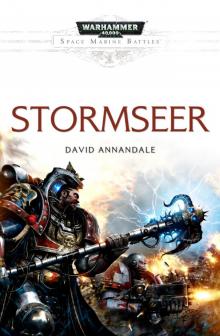 Stormseer - David Annandale
Stormseer - David Annandale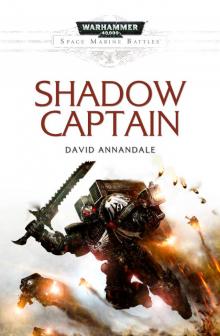 Shadow Captain - David Annandale
Shadow Captain - David Annandale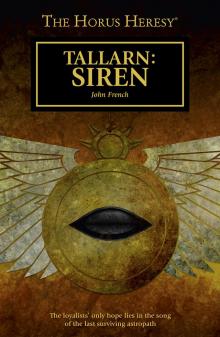 Tallarn- Siren - John French
Tallarn- Siren - John French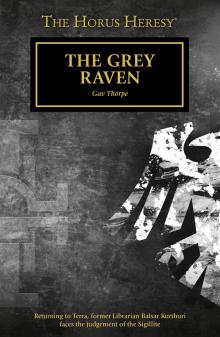 The Grey Raven - Gav Thorpe
The Grey Raven - Gav Thorpe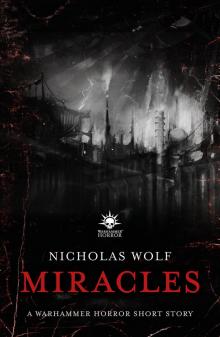 Miracles - Nicholas Wolf
Miracles - Nicholas Wolf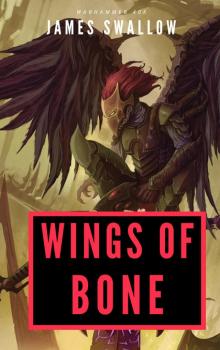 Wings of Bone - James Swallow
Wings of Bone - James Swallow